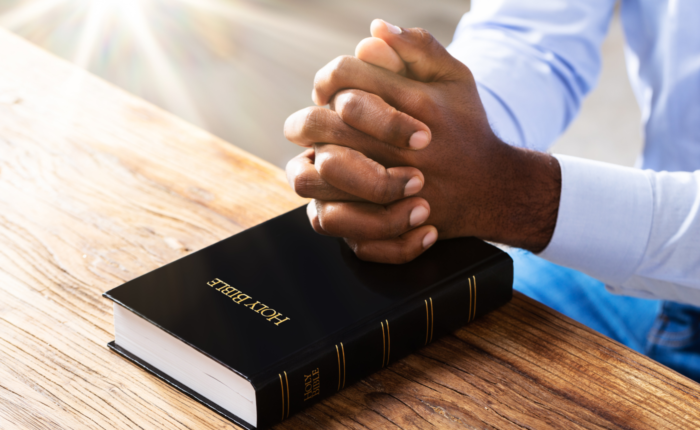Easter this year falls deep into the month of April, long after Spring Break. I’m thankful for this because it’s not vying for attention from our bent to entertainment and endless fun. Lately I have been greatly moved by the Lord’s Prayer in John, Chapter 17, right before He was betrayed and crucified. Verse 9 starts with a statement that is often overlooked: “I pray for them”; while verse 15 repeats that objective pronoun: “I pray not that thou shouldest take them…” I see that I had written on the margin of my Bible this comment: “The Lord’s Prayer for ME. I, a selfish creature, is arrested by the most selfless prayer ever uttered!”
The word pray means “request,” “beg,” or “plead.” And, yes, it is a relationship term simply because there must be the beggar and the supplier. Many of us understand this concept very well because we have mastered the art of asking. Although I’m not an exception to selfishness, what has convicted me of my prayer life is not so much my list of wants as that of the object of my prayers. I was made more aware of this when my husband and I visited our oldest child and her family in Indonesia during their second year in the mission field.
An overnight stay in a hotel before a four-hour drive into their village was the beginning of more than a literal rest that I continue to draw from even to this day. As I got ready for bed and started to draw the blanket over me, I noticed a small sign in the corner of the ceiling. The sign looked like an arrow pointing to a certain direction. I soon found out it was a qibla – an orientation symbol for Muslim prayer; a compass pointing them towards Mecca.
The Muslims’ loyalty to and faith in their religion is very convicting. They say their prayers towards Mecca five times a day, on schedule. When we were there, we felt subjected to listen to the early-morning broadcast of their prayers. Our children’s house sat in front of a mosque, just one street down, so we couldn’t just tune out the ritual. The public prayer over a loudspeaker is repeated around lunch time, and again in the evening. As we traveled around town, I noticed various “Prayer Stations” (musholla). The Muslims would stop whatever they were doing in the middle of the day – whether it be shopping or playing – and they would enter one of these designated prayer areas. I appeared amused, but deep in my heart I was convicted. How sad that I, a child of the true God, the Almighty Jehovah, the Great I AM, do not have even half of the faith and commitment to my God, who sent His Son Jesus Christ to die on the Cross for me.
I also thought about the way I pray. Do I truly pray toward God, or do I pray toward my wants, my wishes, and even my needs; my own “Mecca,” so to speak. Someone has wisely said, “We are not here to prove God answers prayers; we are here to be living monuments of His great grace.” It means that when my prayers are self-absorbed, God’s answers lose their intended grace because He, the Supplier, becomes second to Me, the Beggar.
Then I also thought of my heart’s posture when I pray. Do I intentionally pray like the Lord Jesus prayed for me in John, Chapter 17? The Lord is always intentional, never reactionary. I remember a certain lady from a different place and time. I believe she truly loved the Lord, but when she and I prayed together on some of those Wednesday night prayer meetings, I would get so distracted by her side comments in her prayer. She would pray something like this: “Dear Lord, please protect my son…” then she would turn to me and engage in a conversation and would proceed: “My son is really clumsy, you know. You wouldn’t believe what he did today…” Needless to say, it was quite distracting. It’s comical now, but it wasn’t then; and I’m not sure if it was pleasing to God.
It’s not exaggeration to say that the people in Indonesia appear to pray intentionally to their god. They wash their feet before they go into their musholla; they pray in earnest; they are focused. In contrast, some of us Christians do tend to speak to God very casually, sometimes bordering on irreverent: our prayers are only reactions to our circumstances, not intentional. Worse, we are often not truly praying or begging because we are too busy preaching at God. It’s no wonder the Lord has left us a pattern or a model of what prayer should be (Matthew 6:9-13).
The question that I now ask myself when I pray is not, “To where do I pray?” but “To Whom do I pray?” I don’t need a qibla or a compass for direction; Christ is forever interceding. I definitely don’t need a prescribed schedule of prayer; He is not bound by time. Best of all, I don’t need to get to a certain geographical place to come to Him in prayer; He meets me where I am. In fact, I’m fully persuaded that He is already there before I even arrive: “Father, I will that they also, whom thou hast given me, be with me where I am…” (John 17:24a). It’s truly more than humbling because Christ made this request on His way to the Cross, knowing full well that in three days He would rise again. The compass of His prayer pointed beyond Calvary, and so it must be with my own prayer life. After all, it is a life resurrected with Christ!
V. A. Holding
© 4/10/25

